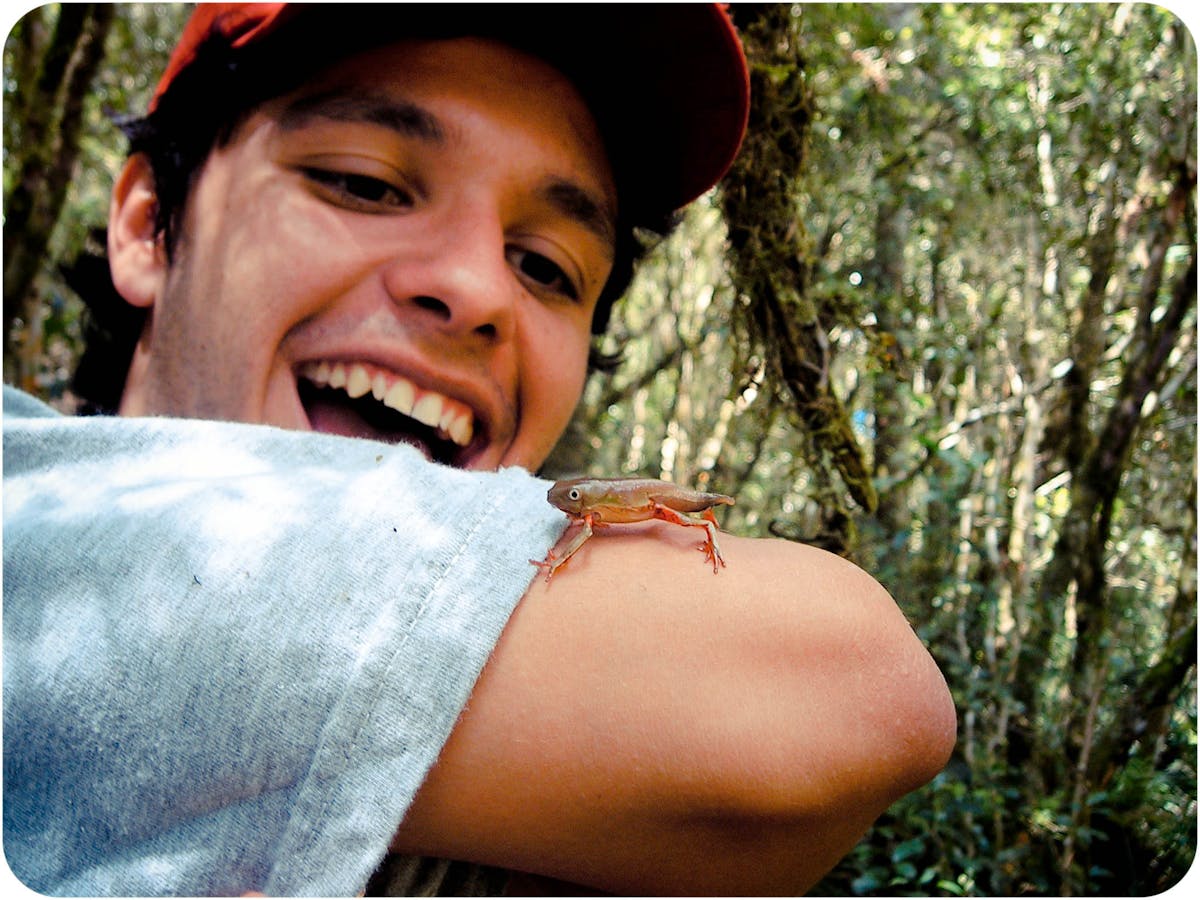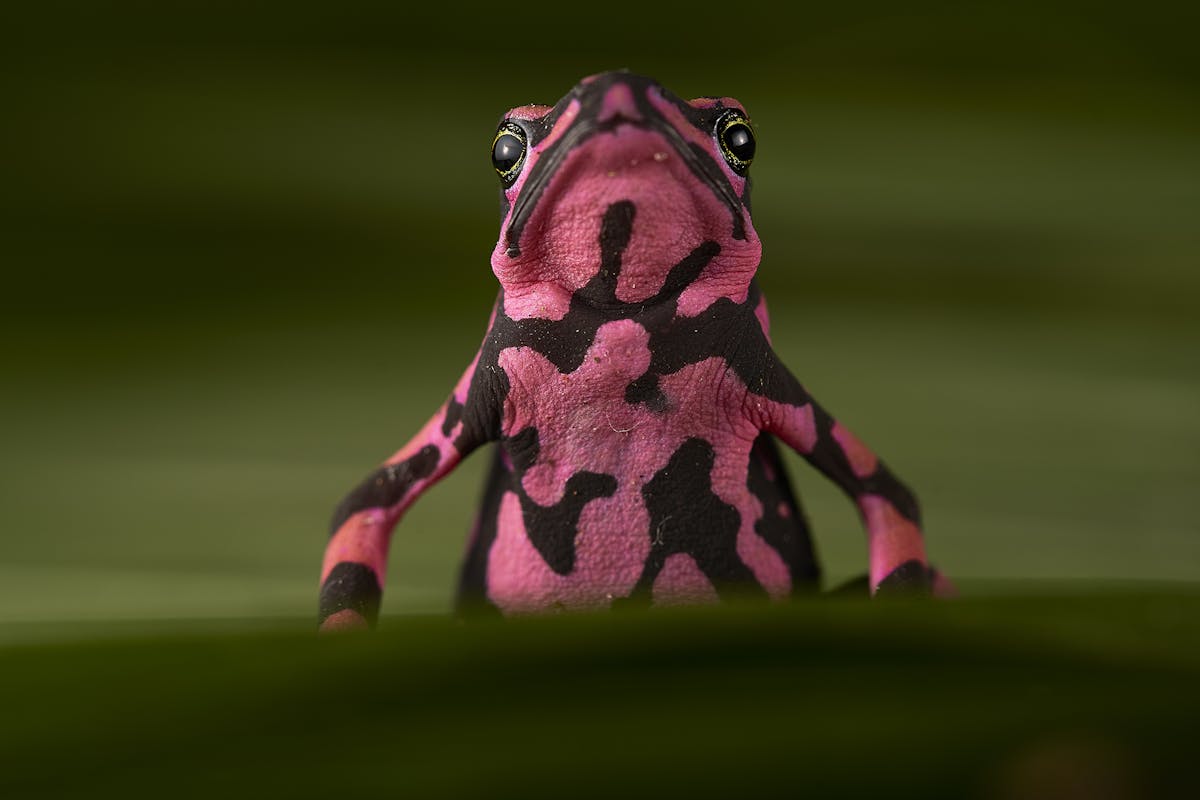Luis Fernando Marin da Fonte
Coordinator, Atelopus Survival Initiative
“Before trying to change the world, I think that we should try to change ourselves. And we can only do that by learning. The only problem with education is that knowledge brings responsibility. If you love amphibians and want to help protect them, then learn, learn, learn! And then tell other people what you have learned, show them how beautiful and important these animals are. Help educate and raise awareness.”
When Luis Fernando Marin da Fonte told his grandmother what he does for a living, she felt sorry for him. She couldn’t understand why he would spend all of his time on frogs—to her, a useless animal. “If people don’t see the importance of something, they don’t value it, unfortunately,” he said.
His grandparents, however, are the ones who got him interested in nature to begin with. Growing up in Brazil’s Porto Alegre (which translates to “happy port”), Luis spent summers away from the city at his grandparents’ house, where he and dozens of cousins explored mountains, waterfalls, forests, rivers and fields.
Dedicating his career to amphibians, however, came out of his desire to be different. While other students were doing fieldwork with mammals, collecting footprints and scat during the day, Luis was spending nights observing frogs and toads. “When I started learning about them, the songs they sing, how diverse they are, the colors...I fell in love with them,” he said.

When he finished his masters in 2010, his amphibian knowledge turned into activism. He was fascinated by the Admirable Redbelly Toad (Melanophryniscus admirabilis), a colorful species endemic to a small swath (700 meters) of riverbed. This small region was also slated for the development of a hydroelectric power plant. It was during this time that he put together a very short film about the toad and, in 2016, had the idea that his superhero, David Attenborough, might narrate it. Through some sleuthing, he found Attenborough’s address and wrote him a letter. Attenborough responded that the toad was beautiful and important and that he would love to help, but at 90, he was too old to travel that far.
Still, Luis and his friends were able to convince the government to revoke permission for this project and ultimately save the toad. And the handwritten letter is a document he still treasures more than any other.
After a visit to his brother in England, he decided he also wanted to spend some time living outside of Brazil, to see the world. A visit to an aunt in Germany provided his way in, and he ended up pursuing a Ph.D. under renowned German amphibian expert Stefan Lötters. During their first meeting, they spoke in a mix of Portuguese, Spanish and English—fortunate for Luis, since he didn’t know any German at all. Seven years later, he was fluent in German, and also connected to amphibian experts around the world. He did his fieldwork in Amazonia, traveling 3,000 kilometers by boat and staying in fishing villages with local families along the way. He was struck by how welcomed his hosts made him feel. “It was one of the most beautiful experiences of my life.”
Back in the South of Brazil, where he now lives full time, Luis was appointed as the coordinator of the Atelopus Survival Initiative <link to more> in July of 2021. Through this work, he is committed to increasing awareness and protection of Harlequin Toads. While he agrees that these toads are important ecologically and to a healthy planet, he believes we should value them for the unique creatures they are. “They should be respected because they live, just like any other animal,” he said.
His dream of working in amphibian conservation became a reality in 2018, when Luis joined the team of the Amphibian Survival Alliance (ASA), a Re:wild partner. With over 65 partner organizations around the globe, the ASA is the world's largest collaborative effort dedicated to amphibian conservation, research and education. ASA's mission is to conserve amphibians and their habitats through a strong, engaged, and collaborative global partnership.
A non-meat eater himself, Luis is currently developing the project "Saving cows, saving frogs," which aims to raise awareness, both within the scientific community and the general public, about the impacts of meat and dairy consumption on the environment, especially its contribution to deforestation, pollution and climate change.

Wild Facts
In 2015 Luis was named an Amphibian Champion by the Amphibian Survival Alliance, and was awarded the 2017 ACRS Future Leader of Amphibian Conservation Prize.
Luis’s favorite Harlequin Toad is the Atelopus hoogmoedi from Brazil (pink morph). It is one of the rarest and most incredible varieties in the amphibian world.
